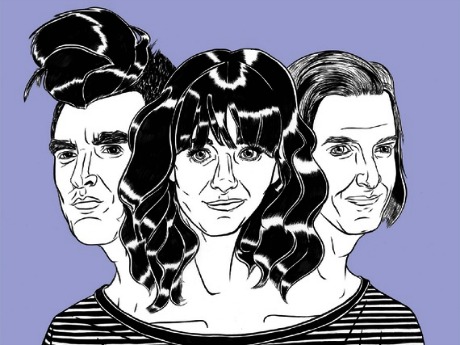“The Twee Revolution,” a month-old Atlantic piece by Jonathan Parker, was sent to me this morning by Sasha Stone. She said that the tone of Parker’s writing reminded her of my stuff on some level. Parker has some fun with his own feelings of twee repulsion but he’s essentially reviewing Mark Spitz‘s “Twee: The Gentle Revolution in Music, Books, Television, Fashion, and Film.” My favorite Parker passage:

“Is Twee the right word for it, for the strangely persistent modern sensibility that fructifies in the props departments of Wes Anderson movies, tapers into the waxed mustache-ends of young Brooklynites on bicycles, and detonates in a yeasty whiff every time someone pops open a microbrewed beer? Well, it is now. If [Spitz’s] book is a little all over the place—well, so is Twee. Spitz hails it as ‘the most powerful youth movement since Punk and Hip-Hop.’ He doesn’t even put an arguably in there, bless him.
“You’re Twee if you like artisanal hot sauce. You’re Twee if you hate bullies. Indeed, it’s Spitz’s contention that we’re all a bit Twee: the culture has turned. Twee’s core values include ‘a healthy suspicion of adulthood’; ‘a steadfast focus on our essential goodness’; ‘the cultivation of a passion project’ (T-shirt company, organic food truck); and ‘the utter dispensing with of cool as it’s conventionally known, often in favor of a kind of fetishization of the nerd, the geek, the dork, the virgin.”
In my mind “twee” is a summation or coming together of several Millenial expressions and creative touchstones, one of which is the musical variant that I once called “oodly-doodly,” and oodly-doodly comes from the same Millenial mentality as shoegaze and other curiously passive musical forms.
I’ve also described this kind of music as the product of “flutter” bands. In an 8.13.10 piece I described their music as “ethereal, dreamily feminine and generally unpunctuated…music that seems dead set against any kind of thump-crunchin’ sound or attitude [and] that seems to summon the candy-assed spirit and attitude of Michael Cera.”
To go by reviews and descriptions, Spitz’s book doesn’t appear to be about cultural lament or admonishings. Parker is saying “look at these twee twerps!” but Spitz isn’t. He’s saying “this is what’s happened…this is the shape and mood of things now, at least in the urban areas among the under-40s.”
In an Amazon.com interview with Rob Sheffield (“Turn Around Bright Eyes”), Spitz says that roots of Twee actually sprouted over a half-century ago:
“Twee, the aesthetic, is born during and just after World War Two,” he says. “Its key figures saw combat and cruelty and destruction. They were scarred by it but not broken. They responded with creativity and sometimes whimsy. I’m speaking of Disney, who was overseas during World War One and made films to rally the troops during the Second World War. So did Theodore Geisel, a.k.a. Dr. Seuss. And Salinger, maybe the most influential Twee figure, who was a solider and saw the horrors of both combat and the camps and later suffered a nervous breakdown. These are the godfathers of the movement, the ones who responded to horror and pain with creativity. Short answer: Brooklyn. Just kidding.”
Sheffield asks “why has twee become such a defining style for our moment in history? What’s so twee about the 21st century?” Spitz replies as follows:
“A few things, really. The world got scary on Election night 2000 and then scarier and scarier and sadder and it kind of drove us into a sort of collective bedroom. And our laptop cameras became our diaries, and our books and records our friends and ways of coping. Then there’s the marketing aspect. In the book I write about the famous VW Cabriolet commercial that features Nick Drake‘s ‘Pink Moon.’ It’s not much of a jump from that to the Garden State and Juno soundtracks winning Grammys and going platinum. Cool got uncool once the Strokes started to disappoint.
“Finally there’s a real estate issue, which is not exclusive to Brooklyn. It became to expensive to live and make art in, as Jeff Daniels would say in The Squid and the Whale, ‘the filets of the neighborhood’ so you find enclaves and parties and cafes and ultimately the Times and tourists outside and a lot of these artists are not ‘city hip’ so it seems like twee is spreading.”
I gotta tell ya, man. I don’t know who or what I am sometimes (“I know less and less about who I am, or who anybody else is”) but wake me up at 3:30 am and I’ll look you right in the eye and tell you I’m not fucking sprinkled with twee dust — that’s for damn sure. I don’t just feel good about not being a passive embodiment or acolyte of twee, which almost sounds like twink. I feel ecstatic about it.
